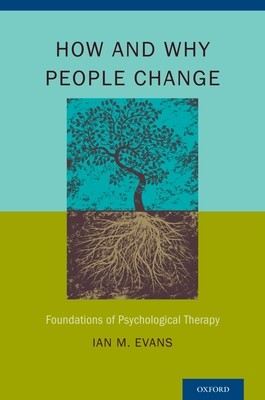
- We will send in 10–14 business days.
- Author: Ian M Evans
- Publisher: Oxford University Press, USA
- ISBN-10: 0199917272
- ISBN-13: 9780199917273
- Format: 15.5 x 23.6 x 3.3 cm, hardcover
- Language: English
- SAVE -10% with code: EXTRA
Reviews
Description
Human beings change constantly; we are in an endless state of flux as we grow, mature, learn, and adapt to a myriad of physical, environmental, social, educational, and cultural influences. Change can be thought of as planful when it is motivated by the desire to be and feel different, such as the change that comes about as a result of deliberate intervention, usually initiated by a troubled individual and aided by another, typically a professional.
In How and Why People Change Dr. Ian M. Evans revisits many of the fundamental principles of behavior change in order to deconstruct what it is we try to achieve in psychological therapies. All of the conditions that impact people when seeking therapy are brought together in one cohesive framework: assumptions of learning, motivation, approach and avoidance, barriers to change, personality dynamics, and the way that individual behavioral repertoires are inter-related. Special emphasis is placed on environmental, social, and cultural influences that allow people to manage their feelings and promote adaptive thoughts and activities. The result is a novel and refreshing look at factors that help people change, which can be mobilized by individuals themselves or their therapists. By looking past the formal techniques of cognitive-behavior therapy, this book explores the processes of therapy as well as the nature of meaningful, long-range, and lasting change. Drawing on a variety of classicand new research studies, this unifying approach is evidence-based, but in a different way from the empirical validation of standardized protocols and manuals. The aim is to encourage both novice therapists and experienced clinicians to re-evaluate basic psychological assumptions in order to promote innovative, individualized, and culturally acceptable interventions. By understanding the sources of change that most influence clients' functioning, the commonalities in apparently different therapeutic theories are recognized, providing a critical perspective for clinical researchers. Rather than suggesting how therapy should be conducted, Evans shows how many different approaches can be understood on the basis of common underlying principles.
EXTRA 10 % discount with code: EXTRA
The promotion ends in 17d.10:37:27
The discount code is valid when purchasing from 10 €. Discounts do not stack.
- Author: Ian M Evans
- Publisher: Oxford University Press, USA
- ISBN-10: 0199917272
- ISBN-13: 9780199917273
- Format: 15.5 x 23.6 x 3.3 cm, hardcover
- Language: English English
Human beings change constantly; we are in an endless state of flux as we grow, mature, learn, and adapt to a myriad of physical, environmental, social, educational, and cultural influences. Change can be thought of as planful when it is motivated by the desire to be and feel different, such as the change that comes about as a result of deliberate intervention, usually initiated by a troubled individual and aided by another, typically a professional.
In How and Why People Change Dr. Ian M. Evans revisits many of the fundamental principles of behavior change in order to deconstruct what it is we try to achieve in psychological therapies. All of the conditions that impact people when seeking therapy are brought together in one cohesive framework: assumptions of learning, motivation, approach and avoidance, barriers to change, personality dynamics, and the way that individual behavioral repertoires are inter-related. Special emphasis is placed on environmental, social, and cultural influences that allow people to manage their feelings and promote adaptive thoughts and activities. The result is a novel and refreshing look at factors that help people change, which can be mobilized by individuals themselves or their therapists. By looking past the formal techniques of cognitive-behavior therapy, this book explores the processes of therapy as well as the nature of meaningful, long-range, and lasting change. Drawing on a variety of classicand new research studies, this unifying approach is evidence-based, but in a different way from the empirical validation of standardized protocols and manuals. The aim is to encourage both novice therapists and experienced clinicians to re-evaluate basic psychological assumptions in order to promote innovative, individualized, and culturally acceptable interventions. By understanding the sources of change that most influence clients' functioning, the commonalities in apparently different therapeutic theories are recognized, providing a critical perspective for clinical researchers. Rather than suggesting how therapy should be conducted, Evans shows how many different approaches can be understood on the basis of common underlying principles.


Reviews